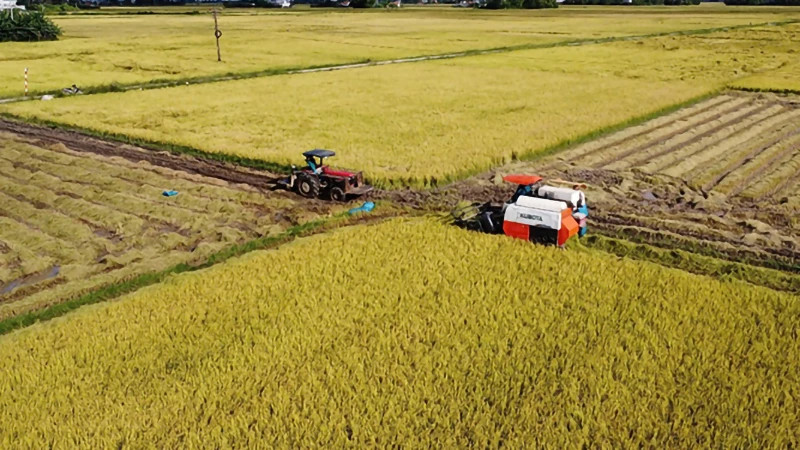This effort has created numerous jobs, enhanced the material and spiritual well-being of residents, and supported goals such as rural development, social security, and public safety.
Positive changes in cooperatives and cooperative croups
Phu Hoa District cultivates approximately 400 hectares of high-quality pineapples, primarily in the communes of Hoa Dinh Dong, Hoa Dinh Tay, Hoa Quang Nam, and Phu Hoa Town. The annual pineapple yield is approximately 1,200 tons, with average productivity at 3 tons per hectare.
However, during harvest season, farmers often struggle to find buyers for their pineapples and face unstable prices. In response to this challenge, Nguyen Hoang Chuong established the Dong Din Agricultural Business Cooperative (Dong Din Cooperative), linking with local pineapple farmers to ensure a stable supply of high-quality raw materials.
The Dong Din Cooperative has invested in advanced machinery and scientific advancements to produce pineapple-based products. According to Nguyen Hoang Chuong, the cooperative now uses modern technology and advanced quality management systems like ISSO and HACCP, meeting various market demands. Its products are branded, with traceability labels, and comply with food safety standards. Currently, Dong Din Cooperative offers nine OCOP products, including two 4-star and seven 3-star products, distributed through e-commerce platforms like Postmart and Coopmart supermarkets, and specialty stores both locally and beyond.
Phu Yen Province hosts two cooperative unions, 70 cooperative groups, and 194 active cooperatives. In the first seven months of 2024, seven cooperative groups and 13 new cooperatives were established, bringing the total number of cooperative groups to 70 and active cooperatives to 194, with combined capital of 697.2 billion VND, including 342.9 billion VND in charter capital.
Additionally, four credit unions are currently in operation. The average revenue of cooperatives and cooperative unions is approximately 3.4 billion VND per cooperative per year (85% of the 2024 plan), with revenue from members at 2.21 billion VND per cooperative per year (78.93% of the plan). Collectively, these cooperatives and groups provide regular employment for over 3,000 workers.
Le Thanh Lam, Chairman of the Phu Yen Cooperative Alliance, noted that the performance of cooperatives has improved, with some examples of highly effective cooperatives in the province. Economic organisations are maintaining high-quality service support for members, expanding joint ventures, and developing agriculture alongside rural industrial production. New value chain models in agriculture are emerging within cooperatives.
Cooperatives have boldly invested in scientific and technological advancements, innovating and improving management methods to meet the demands of the evolving collective economy. Most cooperatives are effective both economically and socially, adhering to the principles of the new cooperative model.
Le Thanh Lam also highlighted that agricultural cooperatives initially providing agricultural input services are increasingly diversifying into comprehensive business activities, developing new industries, and meeting growing member needs. Collaborative models between cooperatives and businesses are emphasised with numerous value chain models in agricultural cooperatives.
The activities of cooperative groups and cooperatives have reinforced their role in developing economic and social infrastructure, restructuring agriculture, building new rural areas, and promoting local economic and social development. They have driven household economic growth and the production of local specialty products. The province currently has 31 OCOP products from 18 agricultural cooperatives, including 3 products rated 4 stars and 28 rated 3 stars.
Strategies to Enhance the Collective Economy
Le Tan Ho, Vice Chairman of the Phu Yen People's Committee and Head of the Provincial Steering Committee for Collective Economy Development, stated that following Resolution No. 20-NQ/TW (dated June 16, 2022) on continuing to innovate and improve the effectiveness of the collective economy, the Phu Yen Party Committee issued Action Program No. 25-CTr/TU on February 6, 2023. The provincial government issued Plan No. 99/KH-UBND on April 26, 2023, and local authorities also developed plans for its implementation.
Authorities are continuing to coordinate with local governments to promote the 2012 Cooperative Law, as well as central and local resolutions and directives on collective economy development. Phu Yen issued Decision No. 1610/QD-UBND to approve a program to support agricultural cooperatives in restructuring agriculture and rural development for 2023-2025 and until 2030.
The programme aims for over 150 active agricultural cooperatives by 2025, ensuring all cooperatives and cooperative unions comply with the Cooperative Law, with 108 production, processing, and consumption value chains for agricultural products.
The province aims to have four agricultural cooperative unions, more than 45 value chain models linked with OCOP products, and 80% of agricultural cooperatives operating effectively by 2030. Each district is expected to have 15-20 new cooperative models that utilise high technology and integrate value chains for sustainable development.
To achieve these goals, Phu Yen has planned key actions including increasing awareness of the collective economy's role, updating and implementing supportive policies, and enhancing state management efficiency in the sector. The strengthening of Party leadership and the leveraging of the roles of the Vietnam Fatherland Front Central Committee, political-social organisations, and the provincial cooperative alliance are also essential for advancing cooperative development.
















